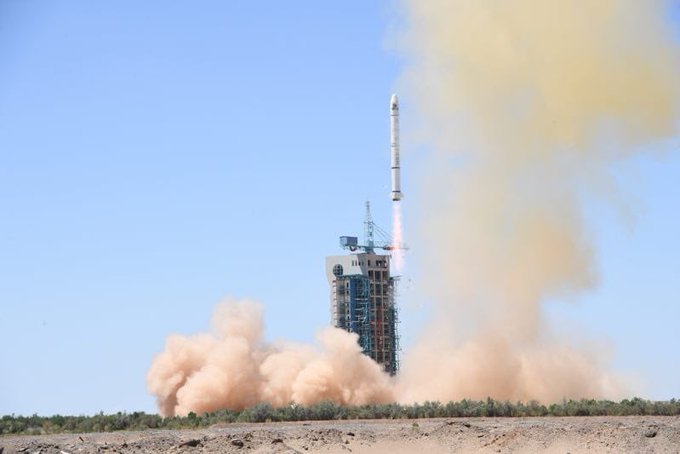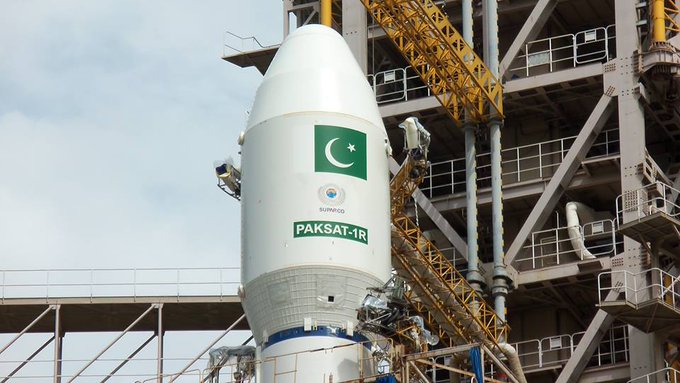ghazi52
THINK TANK: CONSULTANT
- Mar 21, 2007
- 117,101
- 167,271
- Country of Origin

- Country of Residence

Federal cabinet approves Pakistan’s first-ever National Space Policy
Dawn.comDecember 13, 2023

Caretaker Information Minister Murtaza Solangi and interim Minister for Information Technology and Telecommunications Dr Umar Saif address a press conference in Islamabad on Wednesday.
The caretaker government announced on Wednesday that the federal cabinet had approved Pakistan’s first-ever National Space Policy.
In a post on X (formerly Twitter), Caretaker Minister for Information Technology and Telecommunications Dr Umar Saif said that the federal cabinet had approved three “landmark decisions” for the IT and telecom sector.
He said the National Space Policy would enable private sector companies to “offer affordable internet services in Pakistan while enabling increased investment in our national space programme”.
He further said that the National Cyber Crime Investigation Agency (NCCIA) would be established to “replace the Federal Investigation Agency (FIA) for cyber crimes”.
“This new agency will have the required expertise, funding and resources to prevent, investigate and prosecute cyber crimes in Pakistan,” he said.
Saif further said that a “specialised telecom tribunal” would be set up so that “court cases and disputes in the telecom sector can be decided without delay — paving the way for spectrum availability for 5G.”
Addressing a press conference in Islamabad alongside Saif earlier in the day, interim Information Minister Murtaza Solangi said the caretaker federal cabinet had approved the nation’s first space policy under which international companies would be allowed to provide communication services through low-orbit communication satellites.
He said that under this policy, Pakistan would also establish a space regulatory regime per international standards. He said it would also allow for funds to be allocated to the Space and Upper Atmosphere Research Commission (Suparco) for research and development.
Solangi said caretaker Prime Minister Anwaarul Haq Kakar had appreciated the efforts of the relevant ministries in creating the country’s first space policy. He said that the policy was prepared in consultation with all stakeholders over three months.
Meanwhile, Saif told the media that the space policy was “as important as the telecom policy”.
“Pakistan used to have PTCL landlines and the Telecom Act was introduced to reform this sector, and permission was given for private companies to offer telecom services,” he said.
“That is why you all have phones in your hands and SIMs. Now you do not need the intervention of two MNAs for a landline,” he quipped.
Saif said that satellite communication technology was advancing rapidly and many private companies in the world wanted to provide communication services through low-orbit satellites.
“Satellites used to be geostationary, far away from the land. They are useful for broadcasting TV signals but communicating is difficult because there is latency,” he said.
Saif said that communication services and internet services could be offered through low-orbit satellites, which were relatively closer. He said that there had been a lot of development in this regard in the private sector.
“So now it has become possible for communication services in Pakistan to be provided through satellites and the private sector has this technology,” he said.
He said the cabinet’s decision to approve the first space policy meant that the private sector could now offer these services in Pakistan.
“There are many companies which are offering this. There’s Starlink, Leo, OneWeb, there are a lot of companies offering these services,” he said.
“The policy we made is a balanced policy. It means that Suparco and Paksat, which are government institutions, will provide satellite communication and imaging. Government institutions will avail their services but private customers will benefit from low-orbit technology in the private sector,” he said.
He said that the “logical step” that would follow the approval of the policy would be for private companies to start offering these services within the next month or two months.
The minister said that the policy was drafted keeping in mind that a portion of the revenue generated from the private sector could be utilised by Suparco.












